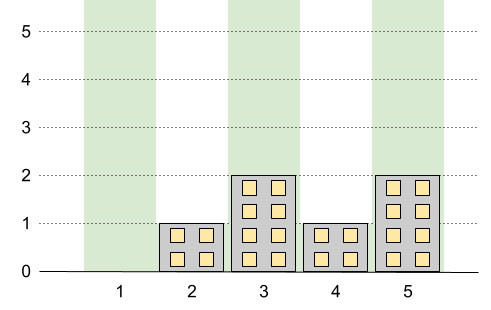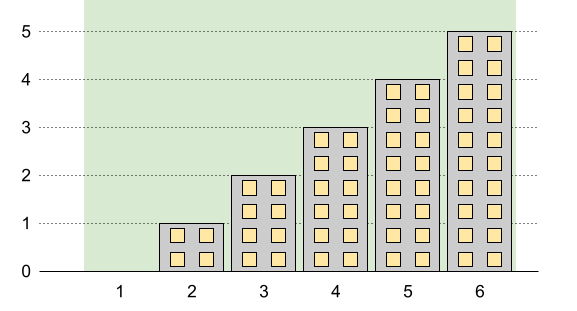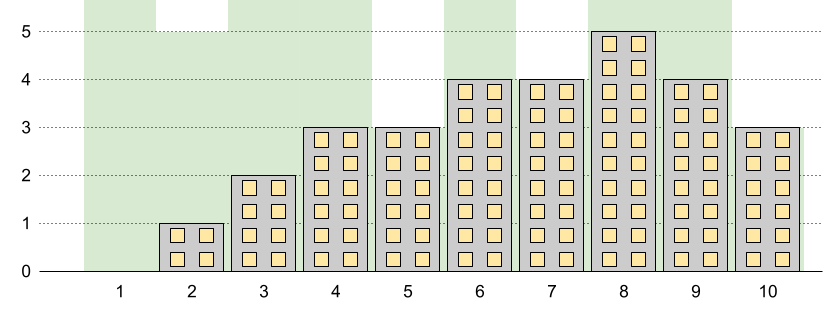You want to build n new buildings in a city. The new buildings will be built in a line and are labeled from 1 to n.
However, there are city restrictions on the heights of the new buildings:
- The height of each building must be a non-negative integer.
- The height of the first building must be
0. - The height difference between any two adjacent buildings cannot exceed
1.
Additionally, there are city restrictions on the maximum height of specific buildings. These restrictions are given as a 2D integer array restrictions where restrictions[i] = [idi, maxHeighti] indicates that building idi must have a height less than or equal to maxHeighti.
It is guaranteed that each building will appear at most once in restrictions, and building 1 will not be in restrictions.
Return the maximum possible height of the tallest building.
Example 1:
Input: n = 5, restrictions = [[2,1],[4,1]] Output: 2 Explanation: The green area in the image indicates the maximum allowed height for each building. We can build the buildings with heights [0,1,2,1,2], and the tallest building has a height of 2.
Example 2:
Input: n = 6, restrictions = [] Output: 5 Explanation: The green area in the image indicates the maximum allowed height for each building. We can build the buildings with heights [0,1,2,3,4,5], and the tallest building has a height of 5.
Example 3:
Input: n = 10, restrictions = [[5,3],[2,5],[7,4],[10,3]] Output: 5 Explanation: The green area in the image indicates the maximum allowed height for each building. We can build the buildings with heights [0,1,2,3,3,4,4,5,4,3], and the tallest building has a height of 5.
Constraints:
2 <= n <= 1090 <= restrictions.length <= min(n - 1, 105)2 <= idi <= nidiis unique.0 <= maxHeighti <= 109
class Solution:
def maxBuilding(self, n: int, restrictions: List[List[int]]) -> int:
r = restrictions
r.append([1, 0])
r.sort()
if r[-1][0] != n:
r.append([n, n - 1])
m = len(r)
for i in range(1, m):
r[i][1] = min(r[i][1], r[i - 1][1] + r[i][0] - r[i - 1][0])
for i in range(m - 2, 0, -1):
r[i][1] = min(r[i][1], r[i + 1][1] + r[i + 1][0] - r[i][0])
ans = 0
for i in range(m - 1):
t = (r[i][1] + r[i + 1][1] + r[i + 1][0] - r[i][0]) // 2
ans = max(ans, t)
return ansclass Solution {
public int maxBuilding(int n, int[][] restrictions) {
List<int[]> r = new ArrayList<>();
r.addAll(Arrays.asList(restrictions));
r.add(new int[] {1, 0});
Collections.sort(r, (a, b) -> a[0] - b[0]);
if (r.get(r.size() - 1)[0] != n) {
r.add(new int[] {n, n - 1});
}
int m = r.size();
for (int i = 1; i < m; ++i) {
int[] a = r.get(i - 1), b = r.get(i);
b[1] = Math.min(b[1], a[1] + b[0] - a[0]);
}
for (int i = m - 2; i > 0; --i) {
int[] a = r.get(i), b = r.get(i + 1);
a[1] = Math.min(a[1], b[1] + b[0] - a[0]);
}
int ans = 0;
for (int i = 0; i < m - 1; ++i) {
int[] a = r.get(i), b = r.get(i + 1);
int t = (a[1] + b[1] + b[0] - a[0]) / 2;
ans = Math.max(ans, t);
}
return ans;
}
}class Solution {
public:
int maxBuilding(int n, vector<vector<int>>& restrictions) {
auto&& r = restrictions;
r.push_back({1, 0});
sort(r.begin(), r.end());
if (r[r.size() - 1][0] != n) r.push_back({n, n - 1});
int m = r.size();
for (int i = 1; i < m; ++i) {
r[i][1] = min(r[i][1], r[i - 1][1] + r[i][0] - r[i - 1][0]);
}
for (int i = m - 2; i > 0; --i) {
r[i][1] = min(r[i][1], r[i + 1][1] + r[i + 1][0] - r[i][0]);
}
int ans = 0;
for (int i = 0; i < m - 1; ++i) {
int t = (r[i][1] + r[i + 1][1] + r[i + 1][0] - r[i][0]) / 2;
ans = max(ans, t);
}
return ans;
}
};func maxBuilding(n int, restrictions [][]int) (ans int) {
r := restrictions
r = append(r, []int{1, 0})
sort.Slice(r, func(i, j int) bool { return r[i][0] < r[j][0] })
if r[len(r)-1][0] != n {
r = append(r, []int{n, n - 1})
}
m := len(r)
for i := 1; i < m; i++ {
r[i][1] = min(r[i][1], r[i-1][1]+r[i][0]-r[i-1][0])
}
for i := m - 2; i > 0; i-- {
r[i][1] = min(r[i][1], r[i+1][1]+r[i+1][0]-r[i][0])
}
for i := 0; i < m-1; i++ {
t := (r[i][1] + r[i+1][1] + r[i+1][0] - r[i][0]) / 2
ans = max(ans, t)
}
return ans
}

